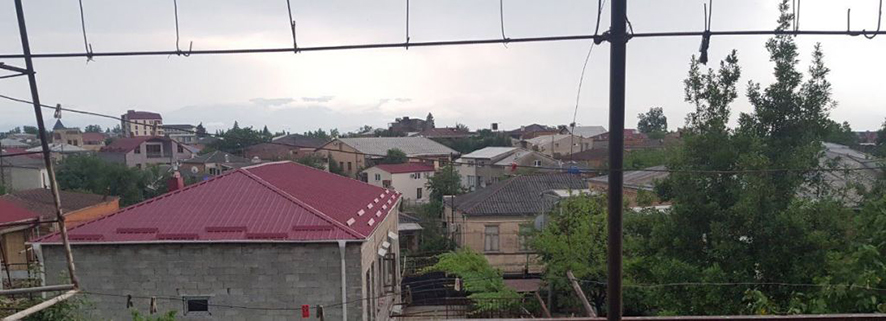In last week’s article, ‘Energy Efficiency – What It Is and Why You Should Be Doing It,’ I started small – delving into the topic of energy from a personal perspective to suggest what we can do financially and technically, as individuals and business owners, to make our own homes and offices more energy efficient. This week, I’m going to look at the issues facing Georgia in its energy efficiency goals – in particular, Georgia’s residential buildings. In my next article, I’ll go into greater detail about what the Georgian government is doing with its partners to develop Georgia’s energy efficiency in line with Western standards.
Following the signing of the Association Agreement with the European Union in 2014, aligning with the EU regulatory framework became a key driver for changes in Georgia’s energy sector, among them the integration of renewable energy, improving energy efficiency, promoting competitive markets, and protecting consumer rights. Tackling energy poverty has emerged as a central focus within these reforms, as it represents a major barrier in Georgia, typically characterized by households lacking access to vital energy services and products.
Georgia’s Energy Poverty
“One of the key issues of energy sector reform is the fight against energy poverty. The phenomenon, defined as the inability of households to access essential energy services and products, remains a major challenge in Georgia,” Tutana Kvaratskhelia, a senior energy policy analyst and energy poverty researcher at the think tank World Experience for Georgia (WEG), told GEORGIA TODAY in our March interview with her.
Energy poverty is defined as the inability to access affordable, reliable, and modern energy services for basic needs like cooking, heating, and lighting.
In Georgia, as in many post-Soviet countries, several factors contribute to energy poverty. These include outdated and energy-inefficient building infrastructure, a sizable portion of the population experiencing social vulnerability, and the prevalence of inefficient energy technologies and limited access to clean energy alternatives.
A 2021 Energy Community Secretariat study posited that 24.6% of households in Georgia are “energy-poor,” while the draft Integrated National Energy and Climate Plan of Georgia suggests that nearly half of Georgia’s population might be experiencing some form of energy poverty.

How Energy Efficient Are Georgian Homes Today?
“As of July 1st 2023, all new buildings should meet minimum energy efficiency standards,” Giorgi Mukhigulishvili, Researcher in Energy and Climate Change Studies, tells us. “In parallel, old buildings must be renovated, and this renovation strategy is currently being developed by the Ministry of Economy and Sustainable Development. Through it, they will set some plans and financial mechanisms to move things forward. Minimum standards already exist for walls, doors, windows, roofs, basements, etc., and refer to heat transference and heat resistance. These follow EU standards, but with local specificity in mind, as we have three different climate zones in Georgia, each with their own requirements and standards in energy efficiency.”
According to Geostat data, the majority of households in Georgia primarily depend on either individual heating facilities, such as wood stoves (81%), or a central heating system (25.6% in urban areas and 6% in rural areas). Natural gas and firewood are the primary sources of heating in Georgia. Firewood is used by 35.4% of all households for individual heating, with the majority (86.1%) of these located in rural areas.

Geostat reports that to manage the burden of high heating expenses, around 43% of Georgia’s households often resort to reducing living space during winter, heating only one room of the house. This is usually the kitchen- where the family eats, sleeps and interacts day-to-day, snuggled around the wood stove. In a 2021 Geostat survey, it was also revealed that many of those with central heating maintain household temperatures below the World Health Organization’s recommended minimum of 18°C in order to reduce their energy bill.
Further, currently, most buildings in Georgia lack proper insulation, resulting in high costs for heating and other energy services, Kvaratskhelia told us. “EU directives require countries to assess the number of households living in energy poverty and to include measures to address this issue in their integrated energy and climate plans (NECPs). Georgia has already drafted its first NECP with measures to address energy poverty. These include programs to increase access to clean energy sources and technologies, financial support to the population to cover energy bills, etc.”
One of those programs is mass gasification. Over the past two decades, Georgia has had a big drive to gasify the country. But, Mukhigulishvili notes, despite energy tariffs being relatively low, with gas and electricity heavily subsidized in the residential sector, citizens newly connected to the grid at first only used gas for cooking, not heating; continuing to rely on wood stoves for that function.
“If we compare the market price of gas in the region overall, around $300 per 1000 cubic meters, in some of Georgia’s regions it is priced at just $40 per 1000m3,” Mukhigulishvili informs us. “Yet, when they gasified the regions of the country, gas consumption did not increase as much as anticipated, as people avoided use of gas for heating, only using it for cooking. Later, because of unsustainable consumption and inaccessibility to wood, people only then installed central heating systems.”

“I always advocate for efficient stoves being provided over gasification, especially in the high mountain regions, because, if you make a cost-benefit analysis on a national level, it is inefficient to gasify areas where families are few and often only live seasonally. It’s far better to have efficient stoves available and encourage the practice of using dried fuel and briquettes,” Mukhigulishvili says.
The burning of wood in traditional, inefficient stoves is known to contribute to indoor air pollution and associated health risks. Indeed, short-term exposure to smoke from inefficient wood-burning heaters, or from the wrong (or damp) fuel burned, can aggravate asthma or worsen pre-existing heart conditions, while long-term exposure can cause heart and lung disease. This is where the right marketing comes in, and Mukhigulishvili tells us that there have been campaigns run by both the state, with donor support, and local NGOs, such as CENN, where energy efficient stoves and solar heaters were provided to a selection of families nationwide. However, he rightly points out that the number of households impacted by these campaigns is not representative of the scale of the issue.
“The good news is that local production of these energy efficient stoves has increased in recent years. Not only those big, traditional Svan stoves, but also, with UNDP and GIZ support, for example, provision of smaller more efficient stoves,” he says.
We ask him about the fuel for those stoves.
“Briquettes are a more efficient and more environmentally friendly solution, created using the waste of different kinds of biomass. Thanks to donor support, we have several production units in different regions of the country, for example in Kakheti – in Akhmeta, in Samegrelo, in Svaneti and Adjara. But because of the low cost of wood, briquettes are not yet as competitive as they should be in the Georgian market.”
The Forest Code Georgia adopted in 2020 demands sustainable practices in the forest, meaning, among other things, that forest waste is used alongside the wood that is cut, lowering the impact on the forest.

“Since the 1990s, we’ve noted the unsustainable manner in which citizens and businesses use our forest resources, not only for energy purposes, but also industrial,” Mukhigulishvili says. “That’s why, to relieve the pressure on the forest, we’re increasingly turning – and encouraging our citizens through legal reforms and education to turn to wooden biomass products, solid waste products, gasification, renewable energy resources, heat pumps, solar water heaters, energy efficient insulation materials for building exteriors and interiors, etc. And there are already suppliers of such products and services countrywide. It is now on us to develop all these resources and support their expansion.”

It is clear that, alongside government reforms and international partner support, the private sector in Georgia has a key role to play, and we will be looking into that in our next energy efficiency article.
***
This article was inspired by the EU-funded Georgia Energy Sector Reform Program (GESRP)’s three-day media mentoring program ‘Covering Energy Efficiency and Renewable Energy Issues in Georgia’ on April 19-21, 2024, at the Tsinandali Estate, Radisson Collection Hotel.














